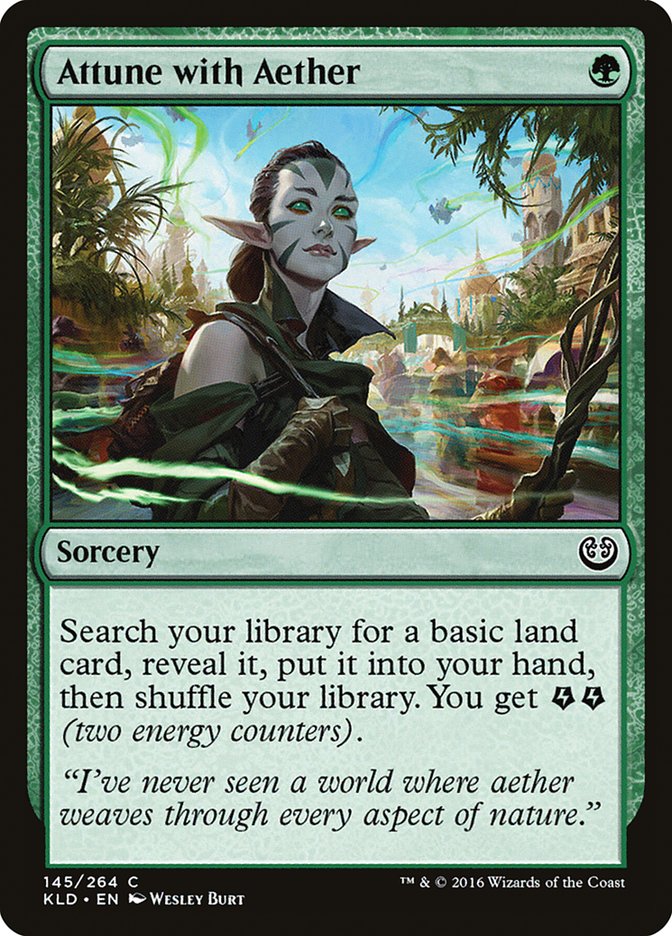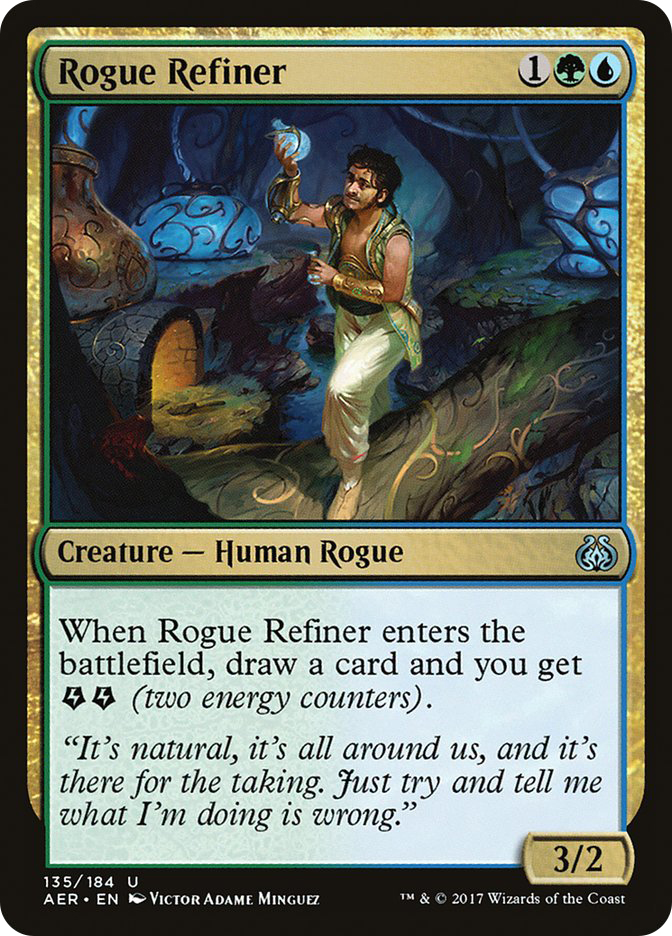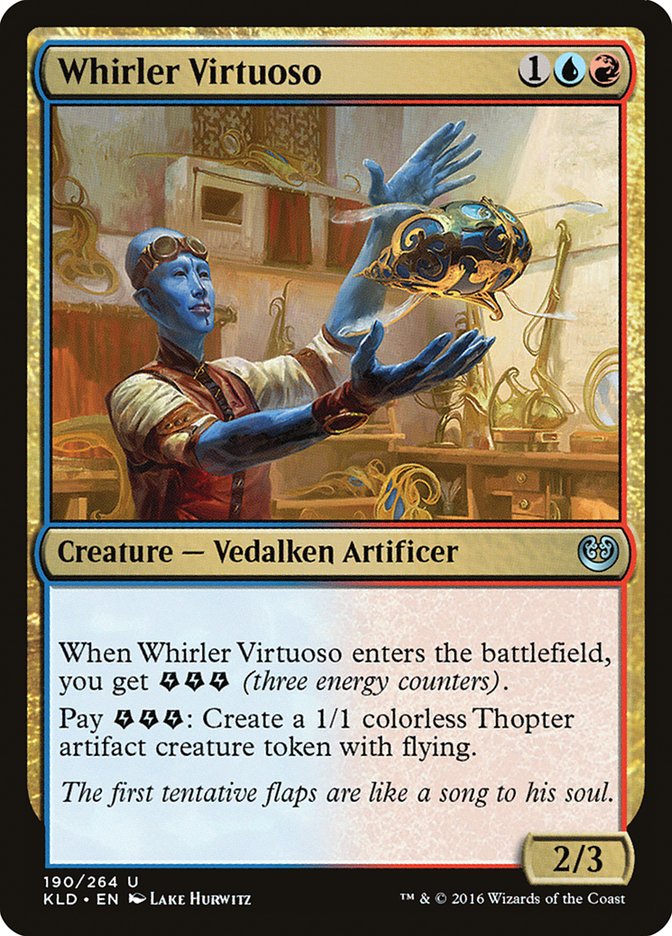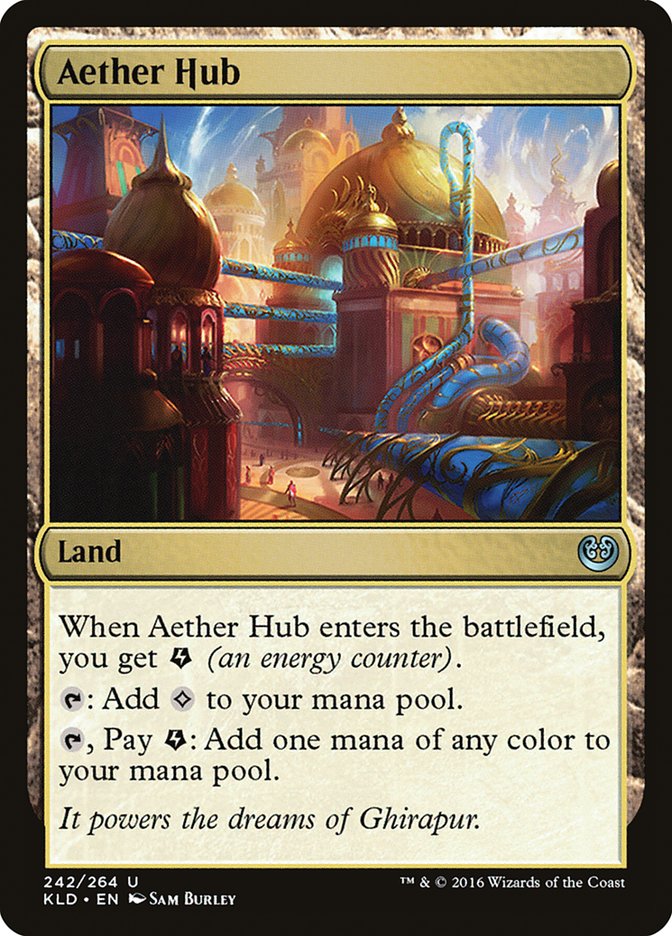[Welcome to
[card name="Fact or Fiction"]Fact or Fiction
[/card]
! This week, Ravenous Chupacabra enthusiast Patrick Sullivan and Pro
Tour Amonkhet champion Gerry Thompson
take on five pressing questions about potential Standard banning. Read
their answers and vote for the winner in the poll at the end!]
1. Attune with Aether should be banned from Standard.
Gerry Thompson: Fact.
Energy is a dominant force in Standard, isn’t comprised of any singular
card that causes the issue, and invalidates wide swaths of other
potentially fun and interesting archetypes with its existence. Something
has to go.
Attune with Aether fixes mana, allowing energy decks to have access to all
the best energy cards at a low opportunity cost. It also means your mana
sources are providing you an additional resource, making it feel like
you’re getting more mileage from your manabase than any other deck in the
format.
Games where the energy deck starts with Attune with Aether and games where
they don’t are drastically different, which should be an indicator that
something is wrong. Something needs to be done about energy, and there’s no
reason to completely ban the deck rather than weaken it. I would attack the
consistency and efficiency angles of the deck and Attune with Aether is
where you start.
Patrick Sullivan: Fiction.
Before delving into all of this, I think it’s important to lay out some
assumptions about parameters and goals. They may not be shared by you, the
reader, or by the fine folks in Renton, but it is my starting point for the
conversation.
1) The power level and ubiquity of Temur Energy is undesirable, and that
these elements are magnified by the nature of the mechanic, suggesting that
new cards are unlikely to enter the deck.
2) There is a desire to preserve the positive elements of the energy
experience.
3) There is not a bias towards crushing the mechanic or propping it up. If
there are no energy decks, that’s cool. But it’s also cool if there is one
energy deck (or even several), so long as there is some diversity in the
card selection and the deck’s power level isn’t obnoxious.
With that out of the way, I think Attune with Aether is worth preserving.
On a deckbuilding level, much of the fun of energy involves trying to mix
and match the energy cards you want, and that experience requires taking
some liberties with the mana. I appreciate the desire to ban this card
because it promises to be effective–the Temur Energy deck would miss its
third land drop and/or be missing colors more frequently. I simply question
if that’s the most satisfying way to balance the experience, to say nothing
of potentially making less irritating/more synergistic builds of the deck
too hard to construct.
2.Rogue Refiner should be banned from Standard.
Gerry Thompson: Fact
. The other half of the problem duo is Rogue Refiner. When new sets come
out and still don’t compare favorably to the energy shell (even after some
cards have been banned), it doesn’t bode well for booster pack sales. As I
said, Rogue Refiner itself isn’t egregious, but it’s part of a larger issue
in the energy decks. Removing either Attune with Aether or Rogue Refiner
might not do enough, but losing the package will significantly weaken
energy decks, which should be the goal.
Patrick Sullivan: Fact.
Though innocuous in some ways, this is one of the more baffling cards to go
to print in the last year, which is saying something. Nothing about this
design speaks to the energy mechanic. The card would show up in decks even
if it didn’t make energy. It’s just free percentage points on the house,
while also crowding out more novel options (that, you know, have a text box
and some play on the table). Banning this card seems like a win in both
worlds–if there’s a new energy deck without this card, that deck is way
more likely to be palatable, and if there isn’t an energy deck without it,
good riddance.
3.Whirler Virtuoso should be banned from Standard.
Gerry Thompson: Fiction.
While Whirler Virtuoso is above rate compared to many of the cards in
Standard and is mostly responsible for Temur having a solid matchup against
aggressive decks, it doesn’t deserve a ban. The real offenders are Rogue
Refiner and Attune with Aether allowing energy decks to have access to that
resource too easily while also increasing consistency of their deck.
Whirler Virtuoso is a problematic threat for control decks and a huge brick
wall against aggro, but if the energy decks didn’t have easy access to the
amount of energy they have, it significantly neuters Whirler Virtuoso.
Whirler isn’t the problem.
Patrick Sullivan: Fiction.
I wish more of the energy experience was about cards like this. It asks you
to lean into energy to make it exciting. It’s naturally on diminishing
returns, so it encourages you to find other outlets for energy. And the
design itself is reasonably good gameplay–it allows for lots of tactical
decisions, it allows the controller to explore artifact synergies, it
encourages flying and trample on the other side of the table, etc. Lastly,
banning this card while preserving everything else might just make the deck
look exactly the same, with the next-best option in Virtuoso’s place.
4.Aether Hub should be banned from Standard.
Gerry Thompson: Fiction.
There’s nothing wrong with Aether Hub. Similarly to Whirler Virtuoso, the
card is really only as good as your energy production. Constantly taxing a
resource to fix your mana is a fine price to pay. Without Attune with
Aether and Rogue Refiner, Aether Hub is still solid but entirely not
banworthy.
Patrick Sullivan: Fiction.
See the above remarks on Attune with Aether. I think it is acceptable to
give energy a bit of a pass on mana when it appears in five colors and asks
the player to explore synergies, and I think attacking the mana is a crude,
heavy-handed way of reducing the deck’s representation.
5.Energy, as a mechanic, was a mistake.
Gerry Thompson: Fiction.
Just because a new mechanic ends up creating a few large issues doesn’t
mean that the mechanic itself was a mistake. Maybe things could have been
implemented better or the development of energy as a mechanic could have
been stronger (*cough* Aetherworks Marvel *cough*), but the energy mechanic
itself isn’t to blame for what happened. WotC shouldn’t be discouraged from
taking risks, such as creating a new resource, but they should learn from
their mistakes.
Maybe the issue with Kaladesh was having a new card type
(vehicles) and a new mechanic, which put too much of a strain on
development. In an alternate timeline, I’m sure the energy mechanic could
have been fun and seen play in Standard without it being overbearing. The
combination of energy being parasitic and it effectively ruining Standard
for over a year is likely going to cause energy to be a hated mechanic, but
it’s not inherently the mechanic’s fault.
Patrick Sullivan: Fiction.
It’s easy to conflate “the mechanic in the abstract” with “the card file as
it exists,” especially when players only interact with the latter. Some
mechanics have play pattern and incentive issues so perverse that even a
“well-executed” file with them would be troubled, like Storm or Dredge.
Energy isn’t nearly that bad. It’s parasitic as hell and the tracking is a
bit burdensome, and those are strikes. Still, Magic’s mana system
encourages tapping out every turn, and there is something novel about a
resource mechanic that allows you to “tap out,” or build up for something
big, or simply wait for more information about what you want to do–energy
promotes that. There is a kernel of something good there, and I think it is
possible to produce an acceptable file with energy as a flagship mechanic.
Was the execution of energy a mistake? Fact. I believe there are two major
issues:
1) Lack of interaction points. It’s important for the energy cards
to have some amount of self-sufficiency. It would be total nonsense to look
at cards that ask you to spend wingdings without telling you how to go
about getting them, and would significantly increase the complexity of
trying to mix-and-match cards in your deck. Therefore, most of the energy
cards are either permanents that make energy upon entering the battlefield,
or spells that produce energy when you cast them. I think it’s correct to
do it that way, but because it is hard to interact with the act of your
opponent accruing energy, it’s really important for you to ultimately be
able to interact with whatever the output is, and energy could have done
better in this regard. Aetherworks Marvel is the most notorious example,
and smaller violations litter the experience.
2) Subsidizing through rate rather than promoting synergies.
Patrick Chapin spoke about this a few weeks ago
. I think, in the ideal world, energy decks would be about finding
interactions between the energy cards that were satisfying–my U/R energy
deck cares about making Thopters, while your G/W energy deck cares about
pumping creatures, or whatever. The Temur Energy deck is a completely
dissonant, non-synergistic collection of creatures and spells with good
rates. Because so much of the power in energy is in cards that would show
up even without an energy clause (Rogue Refiner at the top of the list,
with Glimmer of Genius, Harnessed Lightning, Aether Hub, and Attune with
Aether as less egregious examples), the incentives are to build energy
decks that are piles of stuff that happen to say “energy” on them, rather
than trying to find pieces that interlock in a satisfying way.






